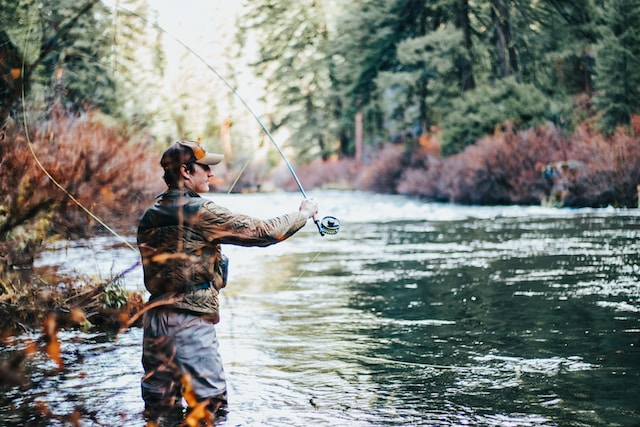Are you ready to immerse yourself in the exciting world of fishing? Whether you are looking for a peaceful outdoor activity or want to catch your first catch, you will have a rewarding and relaxing experience. As a beginner in fishing, it is essential to learn the basics and equip yourself with the necessary knowledge and equipment to increase your chances of success. In this article, we’ll walk you through some essential fishing tips and techniques to get you started on your fishing journey.
Table of contents
Essential Fishing Gear for Beginners
Before you set out to catch fish it’s crucial to gather the right fishing gear. Here are some essential items you’ll need:
Fishing Rod and Reel
Investing in a quality fishing rod and reel is a fundamental step for beginners. Choose a rod and reel combo that suits your fishing style and the type of fish you want to target. Opt for a spinning rod and reel as they are versatile and user-friendly.
Fishing Line
Selecting the appropriate fishing line is essential for a successful fishing trip. Monofilament lines are popular among beginners due to their affordability and versatility. Choose a line with a suitable pound test based on the fish species you intend to catch.
Hooks Sinkers and Bobbers
Having a variety of hooks sinkers and bobbers in your tackle box is essential. Hooks come in different sizes and you should select the right size depending on the fish you’re targeting. Sinkers help your bait sink to the desired depth while bobbers provide visual cues when a fish bites.
Bait and Lures
Different fish species have different feeding preferences so it’s important to carry a selection of baits and lures. Live bait such as worms and minnows are effective for many freshwater species while artificial lures like spinners and jigs can attract predatory fish.
Tackle Box
A tackle box helps you organize and store your fishing gear efficiently. Look for a tackle box with multiple compartments to keep your hooks lures sinkers and other small accessories organized and easily accessible.
Choosing the Right Fishing Spot
Finding the right fishing spot is crucial for a successful fishing experience. Here are some factors to consider when selecting a fishing spot:
Researching Local Fishing Spots
Start by researching local fishing spots in your area. Look for lakes rivers or ponds known for good fishing. Online forums fishing websites or local fishing clubs can provide valuable insights and recommendations.
Evaluating Water Conditions
Pay attention to the water conditions when choosing a fishing spot. Look for clear water with good visibility as it increases your chances of spotting fish. Avoid areas with excessive algae pollution or strong currents as they can negatively impact your fishing experience.
Considering Seasonal Factors
Different fish species have specific seasons when they are more active and abundant. Research the seasonal patterns of your target fish and plan your fishing trips accordingly. For example certain fish might be more active during spring or fall when water temperatures are optimal.
Understanding Basic Fishing Techniques
Mastering basic fishing techniques is essential for beginners. Here are some techniques to get you started:
Casting
Practice your casting technique to accurately place your bait or lure in the desired location. Hold the rod with a firm grip release the line with a smooth motion and aim for a gentle landing on the water’s surface.
Retrieving
Once your bait or lure is in the water learn different retrieving techniques. Experiment with slow and steady retrieves as well as quick and jerky movements to mimic different types of prey. Observe how fish respond to different retrieval styles and adjust accordingly.
Setting the Hook
When you feel a bite or see your bobber go under it’s time to set the hook. Give a quick upward jerk of the rod to drive the hook into the fish’s mouth. Practice the right timing and pressure to ensure a secure hookset.
Reeling in the Fish
After hooking a fish carefully reel it in. Use a steady and smooth reeling motion while keeping the tension on the line. Be patient and avoid applying excessive force that could cause the line to break or the fish to escape.
Fishing Regulations and Ethics
As an angler it’s important to adhere to fishing regulations and practice ethical fishing. Here are some guidelines to follow:
Obtaining Fishing Licenses and Permits
Check your local regulations and obtain the necessary fishing licenses and permits. Fishing without a license can result in fines or penalties. Licenses contribute to conservation efforts and help maintain sustainable fish populations.
Knowing Bag and Size Limits
Be aware of bag and size limits for different fish species. Bag limits specify the number of fish you can keep while size limits dictate the minimum or maximum size of fish that can be harvested. Respecting these limits ensures the conservation of fish populations and their habitats.
Respecting Catch-and-Release Practices
Practice catch-and-release whenever possible especially for fish you don’t plan to keep. Handle the fish gently minimize its time out of the water and use appropriate tools to safely remove the hook. This practice helps preserve fish populations for future generations.
Tips for Beginner Anglers
As a beginner angler here are some additional tips to enhance your fishing experience:
Patience and Persistence
Fishing requires patience and persistence. Be prepared for moments of waiting and keep trying even if you don’t get immediate results. The thrill of a successful catch is worth the time and effort.
Observing Nature and Fish Behavior
Pay attention to your surroundings and observe fish behavior. Look for signs like splashing jumping fish or birds diving into the water. Understanding fish habits and their natural environment can help you locate potential fishing hotspots.
Learning from Experienced Anglers
Don’t hesitate to seek advice from experienced anglers. Join a local fishing club attend fishing workshops or ask for tips from fellow anglers. Learning from those with more experience can help you develop your skills and improve your chances of a successful catch.
Bringing Essential Gear and Supplies
Ensure that you bring all the essential gear and supplies for your fishing trip. This includes your fishing rod and reel appropriate bait and lures a fishing net pliers or a hook remover and sunscreen and insect repellent. Being well-prepared can make your fishing experience more enjoyable and stress-free.
Staying Safe
Safety should be a top priority when fishing. Always wear a life jacket when fishing from a boat or in deep waters and be mindful of any hazards or risks in the area. Avoid fishing alone and inform someone of your location and expected return time.
Conclusion
Fishing can be a fun and rewarding activity for beginners. By choosing the right fishing spot mastering basic techniques and adhering to fishing regulations and ethics you can have a successful and enjoyable fishing experience. Remember to be patient observant and prepared and you’ll be well on your way to becoming a skilled angler.
FAQs
Do I need a fishing license to fish?
Yes in most cases you need a fishing license to fish. Check your local regulations and obtain the necessary licenses and permits.
What is the best time of day to fish?
The best time of day to fish depends on the species of fish you are targeting. Some fish are more active during early morning or late afternoon while others might be more active at night.
What should I wear for fishing?
Wear comfortable and weather-appropriate clothing that allows for a wide range of movement. Consider wearing a hat and sunglasses to protect yourself from the sun.
Can I eat the fish I catch?
Yes you can eat the fish you catch as long as you follow the bag and size limits and adhere to any local advisories or warnings.
What should I do if I catch a fish I don’t want to keep?
Practice catch-and-release whenever possible. Handle the fish gently minimize its time out of the water and use appropriate tools to safely remove the hook.

Dulu is the ultimate destination for gamers looking to enhance their experience. From expert insights and reviews to pro tips and tricks, we offer everything you need to stay ahead of the game. Join our community and unlock the latest gaming news and strategies today!










Add comment